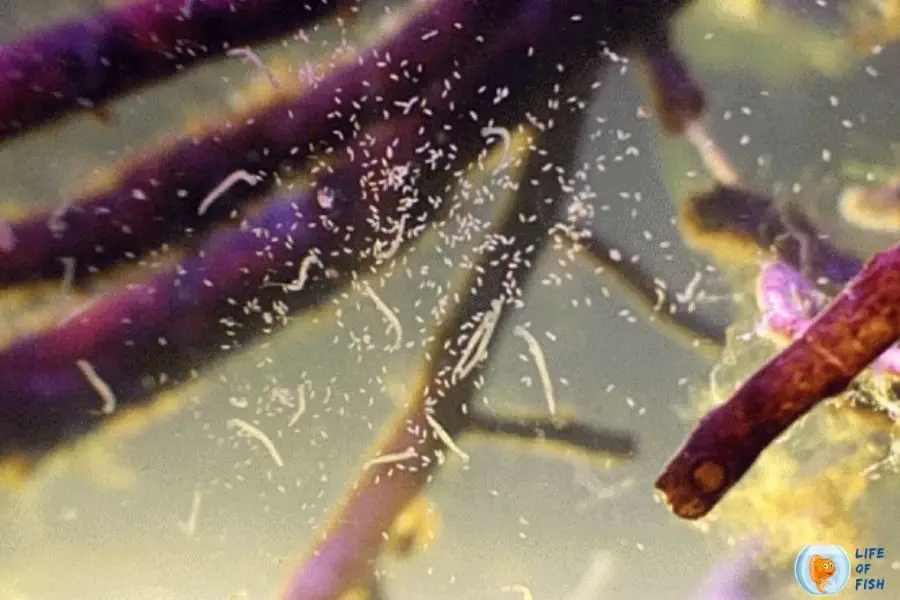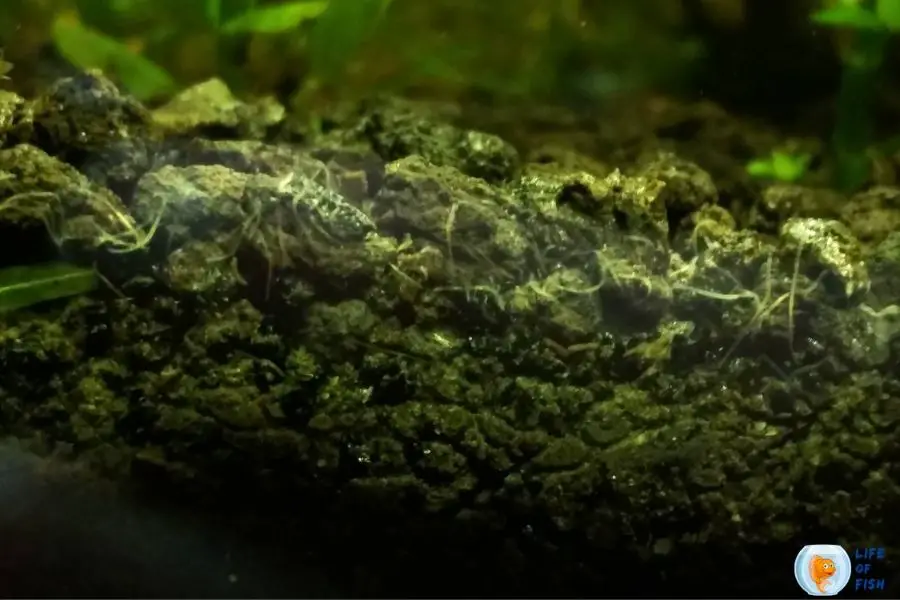Wiggly worms or detritus worms are one of the nightmares of an aquarium owner because they can destroy the pleasant look of the aquarium in a single day.
These thin, stringy, whitish-brown creatures that wiggle around the aquarium usually are detritus worms.
They are harmless and actually help maintain the aquarium clean. A moderate amount of detritus worm populations always live inside aquariums but, you will hardly ever notice them unless they suddenly multiply because of excess food sources in your aquarium.

What are Detritus worms?
Jump To
They are annelid worms that belong to the same family of earthworms, leeches, and ragworms.
They are thin, have whitish-brown color, and look like a string of hair.
Most of them grow about one inch long. They eat only dead and decaying matter. Therefore detritus worms are harmless to aquatic life forms.
However, many aquarium owners misidentify them with deadly planaria worms and think detritus worms are harmful.
In fact, they help keep the aquarium clean by eating dead and decaying matter.
These worms typically wiggle around in water between gravel or pebble substrate because that’s where the food sources of these worms remain.
Detritus worms in aquariums are actually quite common. These worms live inside the gravel of many aquariums and the owners usually never find them out.
Population spike happens when you overfeed your fish. When these worms have access to more food, they reproduce rapidly, leaving thousands of worms inside your aquarium.
Only then, aquarium owners find out the existence of them in their tanks.
Treating them is not recommended as they are a natural part of any aquarium. The best way to eradicate them is to treat the underlying issue of worm spike.
You can either reduce feeding and/or change the substrate to control the detritus worm population.
How big do they get?
There are tens of thousands of detritus worm species that live in freshwater.
They range from 0.25 inch (one millimeter) to two inches (50 mm) long.
These worms can be white, brown, black, or red. However, most of them in freshwater aquariums are whitish brown in color.
Do guppies eat detritus worms?
Guppies are omnivore fish. They eat both plant matter and meaty food. So, naturally, guppies eat them.
However, they most likely will not eat these wiggly worms because they are top feeders. they mostly live under the substrate and rarely swim around the water.
If a worm swims around while guppies are nearby, guppies will definitely eat these worms.
But, guppies won’t bother searching for them to eat around the substrate.

Detritus worms vs. planaria
They are two different species.
As next difference, Detritus worms belong to the annelid genus, while planaria belong to the Turbellaria family.
Detritus are thin, stringy, and wiggly, while planaria are flat and tiny.
Both species have the same whitish color, but if you observe closely, planaria have two small eyespots and protrusions that extend from either side of their widened heads.
Further, their living areas are different. Detritus worms usually live around the substrate, while planaria often crawl around the aquarium glass.
Detritus worms are harmless to any aquatic species because they only eat dead and decaying stuff.
Planaria can be harmful to fish because they eat fish eggs and the eyes and gills of sickly or weakened adult fish.
Planaria are both scavengers and carnivores. But, they do not cause problems for any healthy fish. So, if you are planning to breed your fish, planaria can be a threat.
The real problem of planaria is that they are asexual creatures, eans they reproduce without mating. If you chop these worms into several pieces, a new worm will generate from each piece.
As a result, they are extremely difficult to eradicate.
The only way to eliminate planaria infection in your aquarium is to use a chemical treatment. Again, chemical treatments can be toxic to some aquarium life forms, such as snails and crustaceans.
So, you should confirm that you are dealing with planaria before putting it a step further.
Always check for the introduction of each worm treatment to ensure that they are not harmful to your fish as some fish species like bottom feeders, sharks, piranhas, and some species of scaleless fishes are susceptible to specific worm treatments.
Where do detritus worms come from?
Usually, they come from plants, new fish, or substrates.
They are skillful tiny creatures that can hide behind objects, so you will never see them when you introduce new things to your aquarium.
Believe it or not, almost every aquarium hosts detritus worms, and their owners never see them if the water condition is ideal.
So, if you notice any sudden spike of detritus worms in your aquarium, don’t worry. They might be living in your aquarium for a long time.
Detritus worms reproduce fast when they have access to additional food sources. This spike is usually happening when you overfeed your fish.
Will Salt kill detritus worms?
No. Salt does not do any harm to detritus worms.
If you want to remove them from your aquarium, you need to do a thorough vacuum cleaning in your substrate.
While siphoning, make sure that it sucks all the worms and fish waste from the substrate. You should do this deep cleaning over the course of a few days to avoid stress in your fish.
Next, remove the filtration system and clean it thoroughly; if there are any faults in your filtration system, repair or replace it.
It is necessary to keep clean and well-oxygenated water to keep these worms at bay.
Does copper kill detritus worms?
Yes. Copper is a known treatment for detritus worms.
It kills them. However, copper can also harm snails, shrimp, and other invertebrates.
If you own a shrimp tank that has detritus worms, you MUST avoid using copper to get rid of worms, as copper can kill shrimps at any reasonable dosage.
Are Detritus worms harmful?
Detritus worms are harmless to your fish and plant.
But, overpopulation of the worms can lead to depleted oxygen levels as worms are also breathing. Reduced oxygen levels cause fish to suffocate.
Therefore, it is vital to control detritus worm spikes.
Read Next: Aquarium Insurance – What To Look For?
